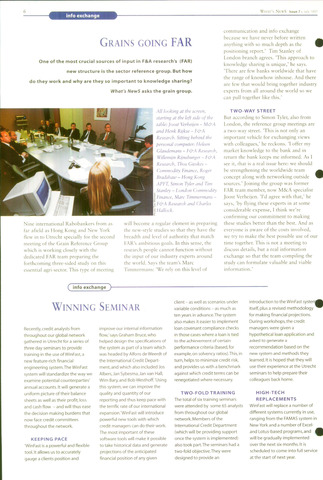Grains going FAR
Winning Seminar
6
info exchange
What's News Issue 7 July 1997
One of the most crucial sources of input in F&A research's (FAR)
new structure is the sector reference group. But how
do they work and why are they so important to knowledge sharing?
What's NewS asks the grain group.
Nine international Rabobankers from as
far afield as Hong Kong and New York
flew in to Utrecht specially for the second
meeting of the Grain Reference Group
which is working closely with the
dedicated FAR team preparing the
forthcoming three-sided study on this
essential agri-sector. This type of meeting
will become a regular element in preparing
the new-style studies so that they have the
breadth and level of authority that match
FAR's ambitious goals. In this sense, the
research people cannot function without
the input of our industry experts around
the world. Says the team's Mare
Timmermans: 'We rely on this level of
communication and info exchange
because we have never before written
anything with so much depth as the
positioning report.' Tim Stanley of
London branch agrees. 'This approach to
knowledge sharing is unique,' he says.
'There are few banks worldwide that have
the range of knowhow inhouse. And there
are few that would bring together industry
experts from all around the world so we
can pull together like this.'
TWO-WAY STREET
But according to Simon Tyler, also from
London, the reference group meetings are
a two-way Street. 'This is not only an
important vehicle for exchanging views
with colleagues,' he reckons. 'I offer my
market knowledge to the bank and in
return the bank keeps me informed. As I
see it, that is a real issue here: we should
be strengthening the worldwide team
concept along with networking outside
sources.' Joining the group was former
FAR team member, now M&A specialist
Joost Verheijen. 'I'd agree with that,' he
says, 'by flying these experts in at some
considerable expense, I think we're
confirming our commitment to making
these studies better than the best. And as
everyone is aware of the costs involved,
we try to make the best possible use of our
time together. This is not a meeting to
discuss details, but a real information
exchange so that the team compiling the
study can formulate valuable and viable
information.'
info exchange
Recently, credit analysts from
throughout our global network
gathered in Utrecht for a series of
three day seminars to provide
training in the use of WinFast, a
new feature-rich financial
engineering system.The WinFast
system will standardize the way we
examine potential counterparties'
annual accounts. It will generate a
uniform picture of their balance
sheets as well as their profit, loss
and cash flow - and will thus ease
the decision making burdens that
now face credit committees
throughout the network.
KEEPING PACE
'WinFast is a powerful and flexible
tooi. It allows us to accurately
gauge a clients position and
improve our internal information
flow,' says Graham Bruce, who
helped design the specifications of
the system as part of a team which
was headed by Alfons de Weerdt of
the International Credit Depart
ment, and which also included Jos
Albers, Jan Sybesma, Jan van Hall,
Wim Bary,and Bob Westhoff.'Using
this system, we can improve the
quality and quantity of our
reporting and thus keep pace with
the terrific rate of our international
expansion.'WinFast will introducé
powerful new tools with which
credit managers can do their work.
The most important of these
software tools will make it possible
to take historical data and generate
projections of the anticipated
financial position of any given
cliënt - as well as scenarios under
variable conditions - as much as
ten years in advance.The system
also makes it easier to implement
loan covenant compliance checks
in those cases where a loan is tied
to the achievement of certain
performance criteria (based.for
example, on solvency ratios).This, in
turn, helps to minimize credit risk,
and provides us with a benchmark
against which credit terms can be
renegotiated where necessary.
TWO-FOLD TRAINING
The total of six training seminars
were attended by some 65 analysts
from throughout our global
network. Members of the
International Credit Department
(which will be providing support
once the system is implemented)
also took part.The seminars had a
two-fold objective.They were
designed to provide an
introduction to the WinFast systei
itself, plus a revised methodology
for making financial projections.
During workshops, the credit
managers were given a
hypothetical loan application and
asked to generate a
recommendation based on the
new system and methods they
learned. It is hoped that they will
use their experience at the Utrecht
seminars to help prepare their
colleagues back home.
HIGHTECH
REPLACEMENTS
WinFast will replace a number of
different systems currently in use,
ranging from the FAMAS system in
New York and a number of Excel-
and Lotus-based programmand
will be gradually implemented
over the next six months. It is
scheduled to come into full service
at the start of next year.
All looking at the screen,
starting at the left side of the
table: Joost Verheijen - M&A
and Henk Rijkse - F&A
Research. Sitting behind the
personal computer: Heieen
Glaudemans - F&A Research,
Willemijn Rijnsburger - F&A
Research, Thos Gieskes -
Commodity Finance, Roger
Bradshaw - Hong Kong
APFT, Simon Tyler and Tim
Stanley - London Commodity
Finance, Mare Timmermans -
F&A Research and Charles
Hallock.

